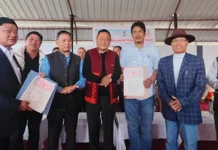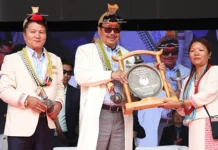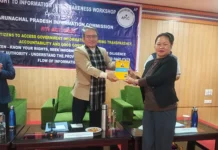NEW DELHI, 9 Jul: Arunachal Pradesh Chief Minister Pema Khandu issued a stark warning over China’s mega hydropower project – the world’s largest dam – being constructed on the Yarlung Tsangpo river (Brahmaputra in India) near the Arunachal Pradesh border.
Calling it an “existential threat” to the tribes and ecology of his state, Khandu said, “This is more dangerous than any military threat. It could be a water bomb. If China suddenly releases water, it would devastate our Siang region and endanger communities like the Adi tribe.”
The dam, reportedly a $137 billion project to generate 60,000 mw, raises alarm because China is not a signatory to any international water-sharing treaties, Khandu said. “Had China been a party to global agreements, this could have been a blessing. But without regulation, it’s a serious threat.”
To counter this, Khandu said that the Arunachal government, in coordination with the Centre, has launched the Siang Upper Multipurpose Project – a strategic move aimed at ensuring water security and mitigating floods in the region.
“China is not transparent about its construction timeline or technical details. So we must act independently to protect ourselves,” he said, speaking to PTI Videos.
He said that local communities are being engaged to build awareness and support for the Indian dam project.
Khandu also emphatically said that Arunachal shares a border with Tibet – not China – pushing back against Beijing’s frequent renaming of places in the state and its claim over the territory.
“Let me correct you here. We share a border with Tibet, not China,” Khandu said, in reference to Arunachal’s 1,200-km-long border. “Officially, Tibet is under China now, but historically and originally, it is Tibet that we border,” he clarified, citing the 1914 Shimla Convention as evidence of India’s Indo-Tibet boundary.
Khandu accused China of renaming places in Arunachal multiple times – five times in total, according to him – but said that India’s Ministry of External Affairs (MEA) has given appropriate responses. “We know China’s habit. They’ve done this before,” he added.
Meanwhile, Khandu called for awarding the Bharat Ratna – India’s highest civilian honour – to the 14th Dalai Lama. “He deserves it for preserving and promoting the Nalanda tradition of Buddhism, which originated in India,” said Khandu, himself a Buddhist.
He credited the Dalai Lama for reviving Tibetan Buddhist institutions in India after fleeing Chinese repression in 1959, and for spreading the teachings of the Nalanda tradition across the Himalayan belt from Ladakh to Arunachal.
Khandu also dismissed China’s role in the selection of the next Dalai Lama. “Tibetan Buddhism is not even practised in mainland China,” he said. “The Dalai Lama institution is recognised mainly in the Himalayan belt and among Tibetan Buddhists. China should not have a role in this matter.”
Referring to the Dalai Lama’s recent 90th birthday celebration in Dharamshala, which he attended, Khandu called the event “historic” and “special,” marked by international participation. He said that the tradition of the Dalai Lama will continue, as agreed by the heads of all major Buddhist sects. (PTI)




